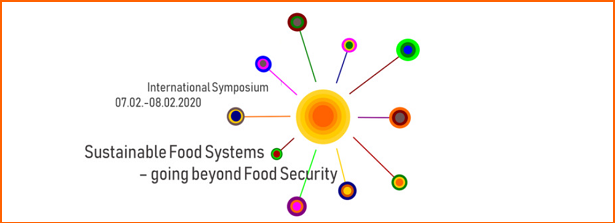
The Food System Symposium 2020 focuses on “Sustainable Food Systems – going beyond Food Security”. The Symposium takes place at the Justus Liebig University Giessen on February 7 and 8, 2020 and addresses the challenge of achieving sustainable food systems in a global context from different perspectives.
As sustainability in the frame of the Sustainable Development Goals (SDG)-agenda excludes a monothematic approach, experts from the field of agronomy, agricultural economics, environmental and ecological sciences, nutritional and social sciences as well as health, collaborate towards an inter- and transdisciplinary approach. The symposium program will include impulse lectures, open dialogue forum, working groups, workshops, and a plenary . Participants are invited to contribute to the symposium with presentations to the open dialogue forum and working groups or to organize a workshop.
Symposium themes
The following themes have already been identified:
- Food value chains: Transforming food value chains in a sustainable way has become a major aspect of the scientific and political discourse. Providing sufficient amounts of nutritious food while conserving natural resources and minimizing environmental impacts require knowledge on the linkages between diet quality and food value chains including modern retail formats. Moreover, profound knowledge both conceptually and empirically about how food value chain transformations interact with food loss and waste (FLW) outcomes and more specifically how FLW reduction/mitigation strategies will impact on food system outcomes is largely missing so far.
- Agroecology and organic farming: A promising option to combat adverse effects of food production which drives the global environmental change is eco-functional intensification based on using internal natural resources and processes to secure agricultural productivity while minimizing negative environmental impacts. Important drivers of success are not technological only but also social innovations. Exploring the joint logic of production and reproduction through approaches on recycling aims at an extended food system approach including feedbacks.
- Recycling nutrients: In contrast to linear oriented current food economics which just works with value chains, it is suggested to work with more traditionally oriented farm economics, which is built on classical economics of reckoning resource constraints and needs for reproduction and recycling. Modernized behavioral approaches emphasize self-sufficiency form the conceptual outline. Though still trading occurs, linking production and consumption as real reproduction will take a modified standpoint stressing interactions in reproduction through valuing.
- Corporate global agriculture: New business models of global agriculture operate at a much larger scale than even commercially oriented family farms and draw on hierarchical labor management. Due to its allegedly superior access to technology and markets, many observers consider such “biological manufacturing” an appropriate model for developing country agriculture. At the symposium we aim to address the economic and ecological sustainability and the social impacts of such business models.
- Food industry: In spite of environmental degradation, competition for resources, increasing food demands, and social injustice the concept of sustainable production is unclear, and has not been effectively put into practice. Future concepts of food and nutrition which are compatible with health, environment, economy, and society – with a local and a global perspective may be developed with support of a nutrition-ecological modelling technique, for example NutriMod.
- Equity and inclusion: Interventions to improve food and nutrition security aim to prevent malnutrition in all its forms. A failure to address gender may exert adverse effects on women and even intensify their workload. Once agriculture trainings are offered a gender balance is achieved easier. A paradigm change in the division of labor between women and men at domestic level may simultaneously and sustainably improve food production, processing, and preparation as well as care.
- Human Health: Making food systems sustainable also means to include human health aspects because access to quality health care is prerequisite to individuals’ ability to work. As only people in good health can consume, digest, and absorb food health is also a prerequisite to the physiological utilization of food. Safety challenges relate to plant food as well as animal-sourced food, and only safe food can serve the individual and the society in a sustainable way.
- This event has passed.

